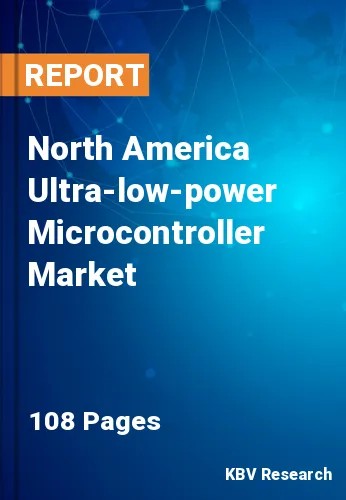Chapter 1. Market Scope & Methodology
1.1 Market Definition
1.2 Objectives
1.3 Market Scope
1.4 Segmentation
1.4.1 North America Ultra-low-power Microcontroller Market, by Packaging Type
1.4.2 North America Ultra-low-power Microcontroller Market, by End User
1.4.3 North America Ultra-low-power Microcontroller Market, by Peripheral Device
1.4.4 North America Ultra-low-power Microcontroller Market, by Country
1.5 Methodology for the research
Chapter 2. Market Overview
2.1 Introduction
2.1.1 Overview
2.1.1.1 Market Composition and Scenario
2.2 Key Factors Impacting the Market
2.2.1 Market Drivers
2.2.2 Market Restraints
Chapter 3. Competition Analysis - Global
3.1 KBV Cardinal Matrix
3.2 Recent Industry Wide Strategic Developments
3.2.1 Partnerships, Collaborations and Agreements
3.2.2 Product Launches and Product Expansions
3.2.3 Acquisition and Mergers
3.3 Top Winning Strategies
3.3.1 Key Leading Strategies: Percentage Distribution (2017-2022)
3.3.2 Key Strategic Move: (Product Launches and Product Expansions : 2019, May – 2022, Jan) Leading Players
Chapter 4. North America Ultra-low-power Microcontroller Market by Packaging Type
4.1 North America 32-bit Market by Country
4.2 North America 16-bit Market by Country
4.3 North America 8-bit Market by Country
Chapter 5. North America Ultra-low-power Microcontroller Market by End User
5.1 North America Consumer Electronics Market by Country
5.2 North America Telecommunications Market by Country
5.3 North America Servers & Data Centers Market by Country
5.4 North America Automotive Market by Country
5.5 North America Aerospace & Defense Market by Country
5.6 North America Healthcare Market by Country
5.7 North America Manufacturing Market by Country
5.8 North America Other End User Market by Country
Chapter 6. North America Ultra-low-power Microcontroller Market by Peripheral Device
6.1 North America Analog Devices Market by Country
6.2 North America Digital Devices Market by Country
Chapter 7. North America Ultra-low-power Microcontroller Market by Country
7.1 US Ultra-low-power Microcontroller Market
7.1.1 US Ultra-low-power Microcontroller Market by Packaging Type
7.1.2 US Ultra-low-power Microcontroller Market by End User
7.1.3 US Ultra-low-power Microcontroller Market by Peripheral Device
7.2 Canada Ultra-low-power Microcontroller Market
7.2.1 Canada Ultra-low-power Microcontroller Market by Packaging Type
7.2.2 Canada Ultra-low-power Microcontroller Market by End User
7.2.3 Canada Ultra-low-power Microcontroller Market by Peripheral Device
7.3 Mexico Ultra-low-power Microcontroller Market
7.3.1 Mexico Ultra-low-power Microcontroller Market by Packaging Type
7.3.2 Mexico Ultra-low-power Microcontroller Market by End User
7.3.3 Mexico Ultra-low-power Microcontroller Market by Peripheral Device
7.4 Rest of North America Ultra-low-power Microcontroller Market
7.4.1 Rest of North America Ultra-low-power Microcontroller Market by Packaging Type
7.4.2 Rest of North America Ultra-low-power Microcontroller Market by End User
7.4.3 Rest of North America Ultra-low-power Microcontroller Market by Peripheral Device
Chapter 8. Company Profiles
8.1 Analog Devices, Inc.
8.1.1 Company Overview
8.1.2 Financial Analysis
8.1.3 Regional Analysis
8.1.4 Research & Development Expenses
8.1.5 SWOT Analysis
8.2 Renesas Electronics Corporation
8.2.1 Company Overview
8.2.2 Financial Analysis
8.2.3 Segmental and Regional Analysis
8.2.4 Research & Development Expense
8.2.5 Recent strategies and developments:
8.2.5.1 Product Launches and Product Expansions:
8.2.5.2 Acquisition and Mergers:
8.3 STMicroelectronics N.V.
8.3.1 Company Overview
8.3.2 Financial Analysis
8.3.3 Segmental and Regional Analysis
8.3.4 Research & Development Expense
8.3.5 Recent strategies and developments:
8.3.5.1 Partnerships, Collaborations, and Agreements:
8.3.5.2 Product Launches and Product Expansions:
8.3.5.3 Acquisition and Mergers:
8.3.6 SWOT Analysis
8.4 Infineon Technologies AG
8.4.1 Company Overview
8.4.2 Financial Analysis
8.4.3 Segmental and Regional Analysis
8.4.4 Research & Development Expense
8.4.5 Recent strategies and developments:
8.4.5.1 Partnerships, Collaborations, and Agreements:
8.4.5.2 Product Launches and Product Expansions:
8.4.5.3 Acquisition and Mergers:
8.4.6 SWOT Analysis
8.5 Intel Corporation
8.5.1 Company Overview
8.5.2 Financial Analysis
8.5.3 Segmental and Regional Analysis
8.5.4 Research & Development Expenses
8.5.5 SWOT Analysis
8.6 Toshiba Corporation
8.6.1 Company Overview
8.6.2 Financial Analysis
8.6.3 Segmental and Regional Analysis
8.6.4 Research and Development Expense
8.6.5 Recent strategies and developments:
8.6.5.1 Product Launches and Product Expansions:
8.7 ON Semiconductor Corporation
8.7.1 Company Overview
8.7.2 Financial Analysis
8.7.3 Segmental and Regional Analysis
8.7.4 Research & Development Expense
8.7.5 Recent strategies and developments:
8.7.5.1 Product Launches and Product Expansions:
8.8 Rohm Semiconductors Co., Ltd.
8.8.1 Company Overview
8.8.2 Financial Analysis
8.8.3 Segmental and Regional Analysis
8.8.4 Research & Development Expense
8.9 Texas Instruments, Inc.
8.9.1 Company Overview
8.9.2 Financial Analysis
8.9.3 Segmental and Regional Analysis
8.9.4 Research & Development Expense
8.9.5 SWOT Analysis
8.10. NXP Semiconductors N.V.
8.10.1 Company Overview
8.10.2 Financial Analysis
8.10.3 Regional Analysis
8.10.4 Research & Development Expense
8.10.5 Recent strategies and developments:
8.10.5.1 Product Launches and Product Expansions:
8.10.6 SWOT Analysis

